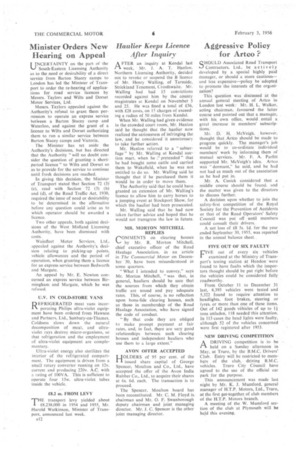Minister Orders New Hearing on Appeal
Page 14

If you've noticed an error in this article please click here to report it so we can fix it.
UNCERTAINTY on the part of the South-Eastern Licensing Authority as to the need or desirability of a direct service from Barton Stacey camps to London has led the Minister of Transport to order the re-hearing of applications for road service licences by Messrs. Taylors and Wilts and Dorset Motor Services, Ltd.
Messrs. Taylors appealed against the Authority's refusal to grant them permission to operate an express service befiveen a Barton Stacey camp and Waterloo, and against the grant of a licence to Wilts and Dorset authorizing them to run a similar service between Barton Stacey camps and Victoria.
The Minister has set aside the Authority's decisions, but has directed that the Authority "will no doubt consider the question of granting a shortr period licence "to Wilts and Dorset so as to provide for the service to continue until fresh decisions are reached.
In giving this decision, the Minister of Transport stated that Section 72 (3). (c), read with Section 72 (3) (b) and (d), of the Road Traffic Act, 1930, required the issue of need or desirability to be determined in the affirmative before any question could 'arise as to which operator should be awarded a licence.
Two other appeals, both against decisions of the West Midland Licensing Authority, have been dismissed with costs.
Wainfleet Motor Services, Ltd., appealed against the Authority's decision relating to picking-up points, vehicle allowances and the period of operation, when granting them a licence for an express service between Bedworth and Margate.
An appeal by Mr. E. Newton concerned an express service between Birmingham and Margate, which he was refused.
U.V. IN COLD-STORE VANS
D EFRIGERATED meat vans incor porating Philips ultra-violet equipment have been ordered from Hawson and Partners, Ltd., Sunbury-on-Thames. Coldness slows down the natural decomposition of meat. and ultraviolet rays destroy micro-organisms, so that refrigeration and the employment of ultra-violet equipment are complementary.
Ultra-violet energy also sterilizes the interior of the refrigerated compartment. The equipment is driven from a small rotary converter running on I2v. current and producing 220v. A.C. with a rating of 100VA. This is sufficient to operate four 15w. ultra-violet tubes inside the vehicle.
£8.2 m. FROM LEVY
THE transport levy yielded about £8,238,000 in 1954 and 1955, Mr. -Harold Watkinson, Minister of Transport, announced last week.
Al2




















































